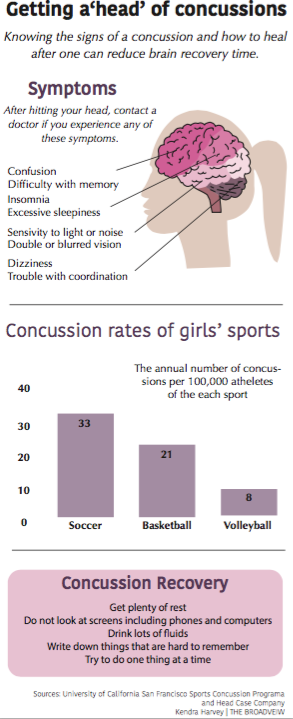Concussions have consequences
Head injuries can have long-lasting, detrimental effects.
December 10, 2015
A bump to the head may seem like it can be healed in a few days, but untreated, serious concussions cause permanent brain damage.
After getting her wisdom teeth pulled, senior Julia Praeger expected to have her time filled with smoothies and a sore mouth, but when she hit her head from fainting on the kitchen counter after taking her blood ridden gauze out, she went to the doctor and was diagnosed with a mild concussion.
“I felt light headed, like I was always hungry or thirsty, and if I stood up too fast I would get dizzy,” Praeger said. “I felt like that for about a week or so after the concussion.”
Although Praeger’s concussion was mild, Tatiana Gutierrez (’15) took medical leave for the first quarter at Santa Clara University after suffering a concussion.
“I was on my friend’s back and basically I slipped off and the back of my head hit the concrete,” Gutierrez said.
Gutierrez could not recall the incident after the fall. Her friends took care of her for the rest of the night and she went to bed instead of immediately going to a doctor.
Contrary to popular belief, a person suspected of having a concussion does not need to be kept awake if she is able to keep a conversation, walk and does not have dilated pupils. The injured person can sleep and be woken in two hour increments to check that she can easily be awaken and are not displaying worse symptoms, according to the Dartmouth College of Sports Medicine.
Gutierrez went to the emergency room two days later, after she could not remember conversations, had headaches and was sleeping for most of the day. There she underwent neurological tests that determined she had a concussion.
“I don’t know why I didn’t think I had a concussion,” Gutierrez said. “I was still really slow with my thought processing and putting one and two together. I couldn’t really think about that ‘Oh I hit my head on the sidewalk I should go see a doctor.’ I just thought I fell.”
Doctors ran tests where Gutierrez had to walk heel to toe, follow the doctor’s finger with her eyes and hold her arms up on her own.
“If there was something seriously wrong with me like a brain bleed, I wouldn’t be able to do these motor skill functions,” Gutierrez said. “They even asked me to smile, and you figure that you can do that naturally. It was scary that they asked such simplistic things of me to see if I was all right.”
If not treated, concussions’ long term effects include spasm disorientation, loss of memory, slowed ability to process information and difficulty with conversations. Traumatic brain injuries that are confused as concussions can even result in comas, according to BrainLine, a multimedia project to inform the public of brain injuries.
Especially with mild concussions, not all the symptoms of lack of motor skills, confusion, dizziness or blurred vision are not always evident.
“I didn’t know I had a concussion,” Praeger said about her fall. “There was just an ache in my head.”
Mild concussions, although sometimes hard to detect, need to be treated or else the symptoms may worsen and delay the brain’s healing process.
“One of the most obvious signs of a concussion is a headache,” on-campus sports trainer Kevin Dinglasan, who also works at University of California San Francisco for Sports Medicine said. “Unfortunately you can get headaches from almost anything. Because that is one of the more general symptoms, it makes it harder to see if it’s a concussion.”
Gutierrez has had concussions in the past, but this one was the worst and requires the most recovery time. Post-concussive syndrome, causing symptoms of concussions to last for weeks and months, usually happen after multiple concussions.
Gutierrez’s recovery includes lots of rest and minimal screentime. The Center for Disease Control and Prevention also recommends slowly returning to other activities and not doing anything strenuous on the brain.
“Screen time and texting and boredom are challenges,” Diane Gutierrez, Tatiana’s mom who has been helping with the recovery process, said. “Even hearing something read is difficult, and you can easily overthink.”
Looking forward, Gutierrez says she will be more careful during her time at college.
“It made me have a new perspective on how I am going back to school,” Gutierrez said. “I am not invincible. It is really in college to think ‘I’m young, I’m healthy, I can have fun with my friends.’ I never thought a piggy back ride could withdraw me from school.”










